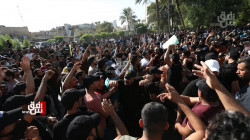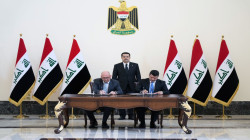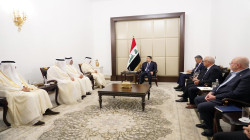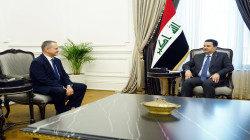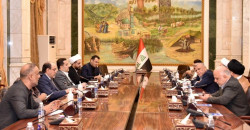PM Al-Sudani's photo with the "powerful governors": alliance or coincidence?
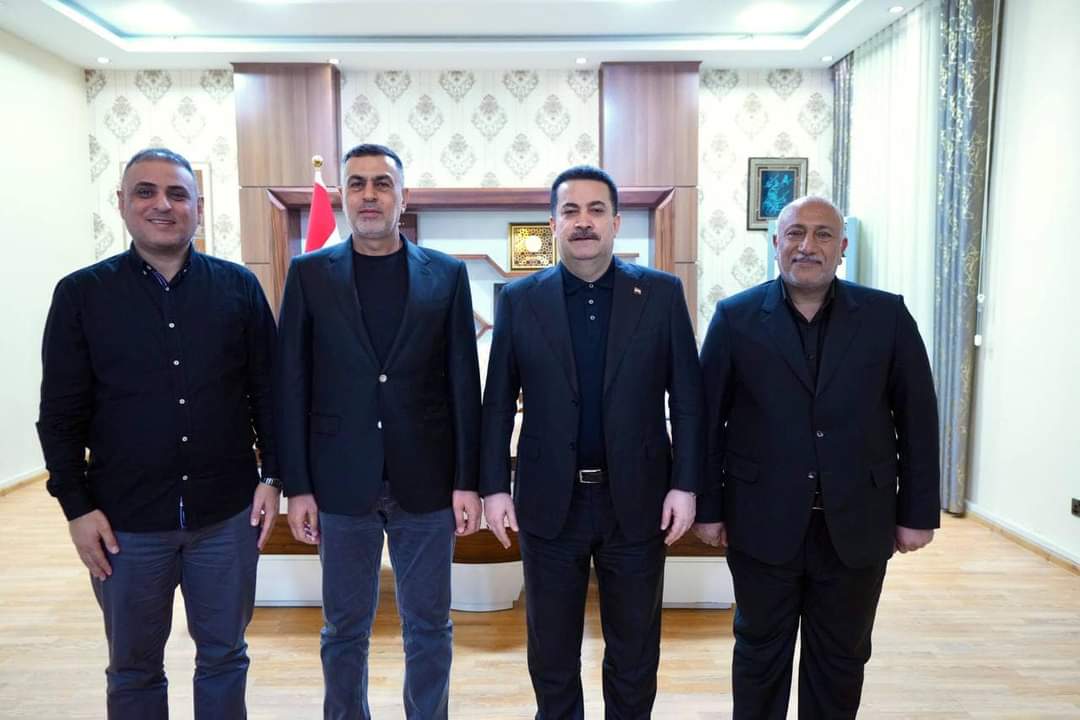
Shafaq News/ Iraqi Prime Minister Mohammed Shia al-Sudani's recent appearance alongside the governors of Karbala, Basra, and Wasit during the Arbaeen pilgrimage has ignited political speculation in the public and political spheres.
The meeting, during which al-Sudani commended the governors for successfully managing the world's largest religious gathering, has fueled debate over whether this meeting signals an emerging alliance ahead of the upcoming parliamentary election or was merely coincidental.
The governors—Asaad al-Eidani of Basra, Mohammed Jameel al-Mayahi of Wasit, and Nassif al-Khattabi of Karbala—have become increasingly influential since securing sweeping majorities in their respective government councils.
Their rise marks them as formidable Shiite political figures, challenging the traditional power held by Iraq's Coordination Framework, a consortium of mainly Iran-backed Shiite political forces.
Amid these developments, some leaders within the Coordination Framework sought to prevent these governors from taking office, concerned that their local electoral success could translate into significant gains in the parliamentary election. However, according to political observers, Prime Minister al-Sudani has consistently supported the renewal of their terms, citing the strong performance of their electoral lists in the recent local elections.
Picture Worth A Thousand Words
"There is a Chinese proverb that says, 'A picture is worth a thousand words,' and this image does not require verbal explanations to convey its content," political analyst Saif Saadi remarked.
He suggested that this image might have implications for upcoming electoral alliances, particularly regarding Iraq's sixth parliamentary election. "Is not unlikely that al-Sudani could forge an alliance with the governors of Karbala, Wasit, and Basra, considering that this trio secured overwhelming majorities in the local election, which led to forming local governments loyal to them in their respective governorates," Saadi added.
" Al-Sudani and former Prime Minister Nouri al-Maliki have their fair share of major and clear disagreements over the election law and the selection process for the parliament speaker," Saadi pointed out. "This disagreement might be sufficient reason for al-Sudani to leave the Coordination Framework and ally with the victorious governors."
Saadi speculated that the Sadrist Movement, which is also likely to play a role in the upcoming parliamentary election, might join hands with al-Sudani and the trio of governors. The Powerful Shiite cleric (Al-Sadr) has been laying the groundwork for a political comeback two years after a failed and ultimately deadly high-stakes move to form a government without his Shiite rivals, particularly Nouri al-Maliki. Saadi said that if it managed to see the light, the alliance might "pose a serious challenge to the Coordination Framework," bringing back memories of one of the longest political deadlocks in the post-Saddam era in 2021.
"The next electoral landscape will be very challenging, especially with various factions possibly entering the fray, including those with military and political wings. Each side perceives the other as a threat to its electoral base, which presents a real challenge," he explained.
"Each al-Sadr and al-Maliki are expected to secure at least 50 or 55 seats at least…Al-Sudani is no less ambitious than both of them. He is also eying a share of 50 seats."
"The incumbent prime minister is betting on the electoral weight achieved in the last local elections and is keen to resolve issues in Baghdad, particularly regarding infrastructure projects, which he aims to showcase as achievements. These factors could potentially attract voters," Saadi said.
Filling The Void
Political analyst Ahmed al-Yaseri described Prime Minister al-Sudani's recent appearance with the three governors as a "natural" development. Speaking to Shafaq News Agency, al-Yaseri stated, "The image of Al-Sudani with the three governors is a natural product of the current division within the Coordination Framework, of which al-Sudani was a key figure with a deeply rooted ambition to establish his political project."
Al-Yaseri pointed out that "this ambition is evident from the two calls by State of Law Coalition leader Nouri al-Maliki for early elections. There is a sense within the State of Law bloc that al-Sudani seeks to position himself as the leader of the current phase, capitalizing on the leadership void within Shiite political circles, especially following the withdrawal of the Sadrist Movement."
He added that "al-Sadr's withdrawal has not only affected the grassroots in the Shiite community, but also the elite level, reinforcing the idea of a leadership vacuum within the Shiite community."
Al-Yaseri argued that "the photograph is natural because these individuals are governors, and Al-Sudani is the prime minister." However, he noted that Al-Sudani has founded a political movement and is currently working towards participating in the upcoming parliamentary elections.
"He is trying to attract figures from across the political spectrum to create a centrist movement that blends both Islamic and secular elements," al-Yaseri explained.
He added that al-Sudani is now "focused on action" and is determined not to repeat the mistakes of former Prime Minister Haider al-Abadi, who, according to al-Yaseri, "focused on defeating ISIS but failed to present an economic or development project."
Deliberate Message
Political analyst Alaa Mustafa dismissed the photo as a coincidence, stating, "It is a calculated move, and the photo sends a deliberate message at this particular time."
In his remarks to Shafaq News Agency, Mustafa noted, "If we consider the recent developments, we find that al-Sudani supported the nomination of these governors and worked to convince the Coordination Framework to renew their mandates, especially in Basra and Wasit. These governorates hold a special status, as they were not initially part of the Coordination Framework's coalition, making them more likely candidates for future partnerships."
He continued, "When we review the projects and packages being launched, we see that these regions hold significant influence. A clear example is the series of projects announced for Karbala during the conference on the success of the Arbaeen pilgrimage plan. These projects will take considerable time to complete, but their announcement at this moment is an attempt for electoral promotion."
Mustafa added that the Prime Minister focuses heavily on Baghdad, mainly through infrastructure projects such as bridges, aiming to bolster his image in the capital. "In these governorates, he relies on the image of these governors, whose popularity surged in the recent local elections. This strategy could allow him to secure victory in Baghdad while these governors win in their respective governorates, paving the way for an electoral success that could boost his chances of securing a second term," Mustafa explained.
The analyst indicated that the Coordination Framework is currently in a difficult position. "The [Coordination] Framework does not want to disrupt the government, as it was responsible for its formation. It also seeks to avoid stirring public opinion or creating issues that might awaken the withdrawn Sadrist Movement, which could gain electoral leverage that would, in return, weaken the Coordination Framework in the future," Mustafa said.
Mustafa said that while al-Sudani has managed to win over some elements of the Coordination Framework, three major factions remain at odds with him. "These factions are at a crossroads with Al-Sudani, and while they could potentially resolve their differences, we have yet to see any significant efforts in that direction," he noted, suggesting that the governors who met with al-Sudani might harbor ambitions to lead the next government, which could make the unannounced agreement public and possibly lead to the formation of a "Coalition of Achievements."
